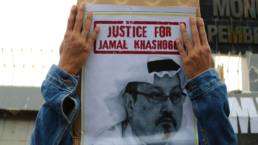By Basav Sen, Foreign Policy In Focus
President Biden has set out on his travels to Saudi Arabia. The implications of the trip for the intertwined issues of human rights and energy policy are dire.

The Saudi Arabia visit represents a 180-degree turn for Biden, who once called Saudi Arabia a “pariah” while campaigning for president. (A side note — “pariah” is an offensive slur directed at Dalits, who are the most oppressed in India’s caste hierarchy, and public figures in the U.S. and worldwide would do well to refrain from using such terms in the future.)
Since 2015, Saudi Arabia has been bombing neighboring Yemen as part of their intervention in an ongoing civil war. Saudi bombs have “indiscriminately killed and injured civilians,” according to Human Rights Watch — more than 18,000 to date.
Upwards of 20 million Yemenis are facing severe hunger because of the conflict. Human Rights Watch calls it “the largest humanitarian crisis in the world.” While the conflict is now on pause because of a UN-mediated truce, that neither provides any assurance that the war won’t resume, nor that Saudi Arabia will face accountability for its war crimes.
At home, the Saudi government jails and tortures dissidents, among other severe human rights violations. Saudi dissidents aren’t safe outside the kingdom either — Saudi agents murdered prominent dissident and journalist Jamal Khashoggi, a resident of the United States, at a Saudi consulate in Turkey.
Recent Posts
‘Unconstitutional. Unethical. Authoritarian.’ ICE Bars Millions Of Immigrants From Bond Hearings
July 18, 2025
Take Action Now One watchdog said the new policy “seems like a blatant attempt to stop them from exercising their right to due process.”……
Americans Are Not Nearly Alarmed Enough About Climate Change
July 18, 2025
Take Action Now Americans still don’t comprehend how imminent, dangerous, and far-reaching the threat is—and journalists are partly to blame.By…
The IRS Is Building A Vast System To Share Millions Of Taxpayers’ Data With ICE
July 17, 2025
Take Action Now ProPublica has obtained the blueprint for the Trump administration’s unprecedented plan to turn over IRS records to Homeland Security…
Israel’s Sudden Assault On Syria Is Unchecked Aggression
July 17, 2025
Take Action Now Jerusalem is bombing Damascus and threatening al-Sharaa’s rule, while Washington was hoping to help the nascent government on…




